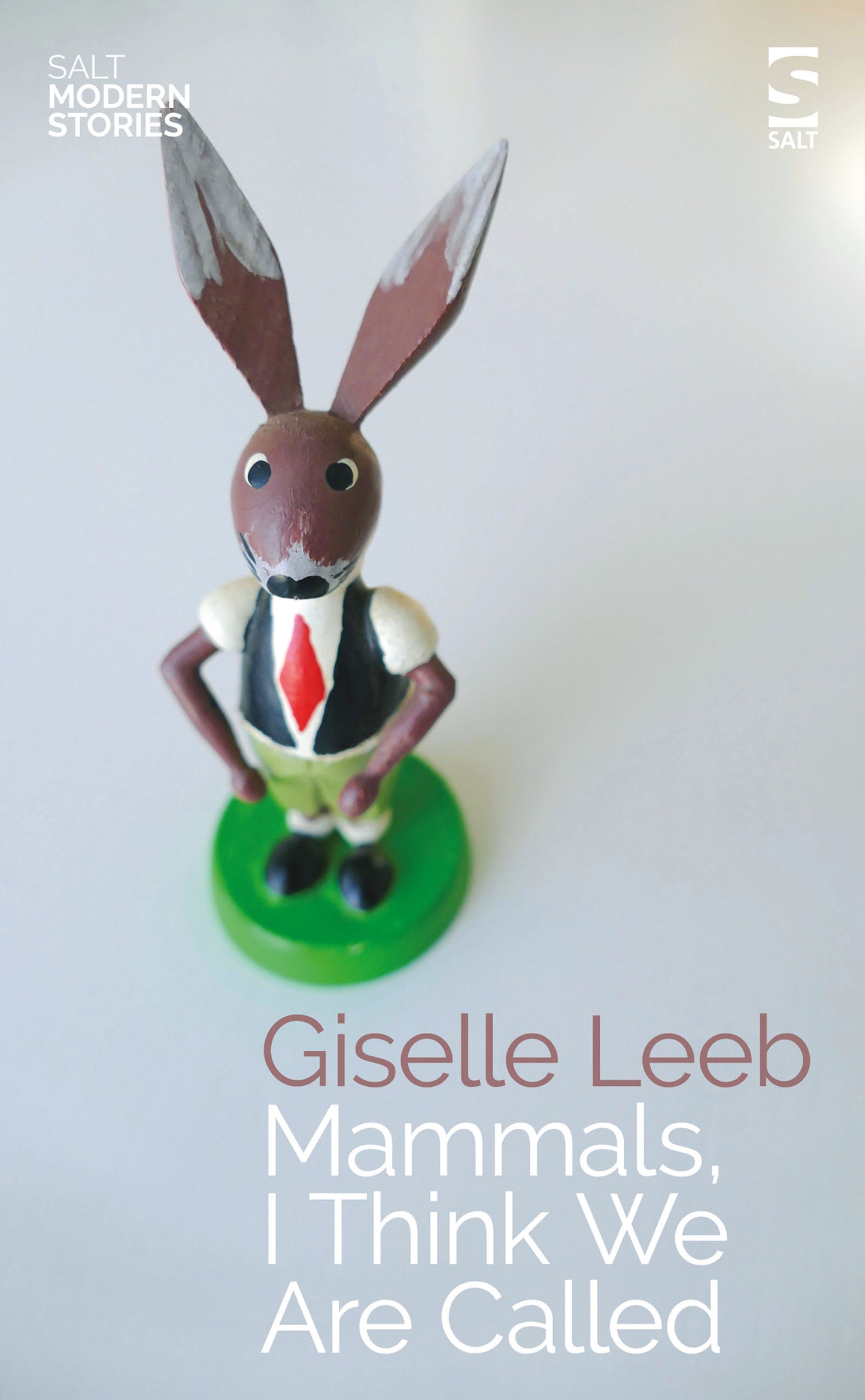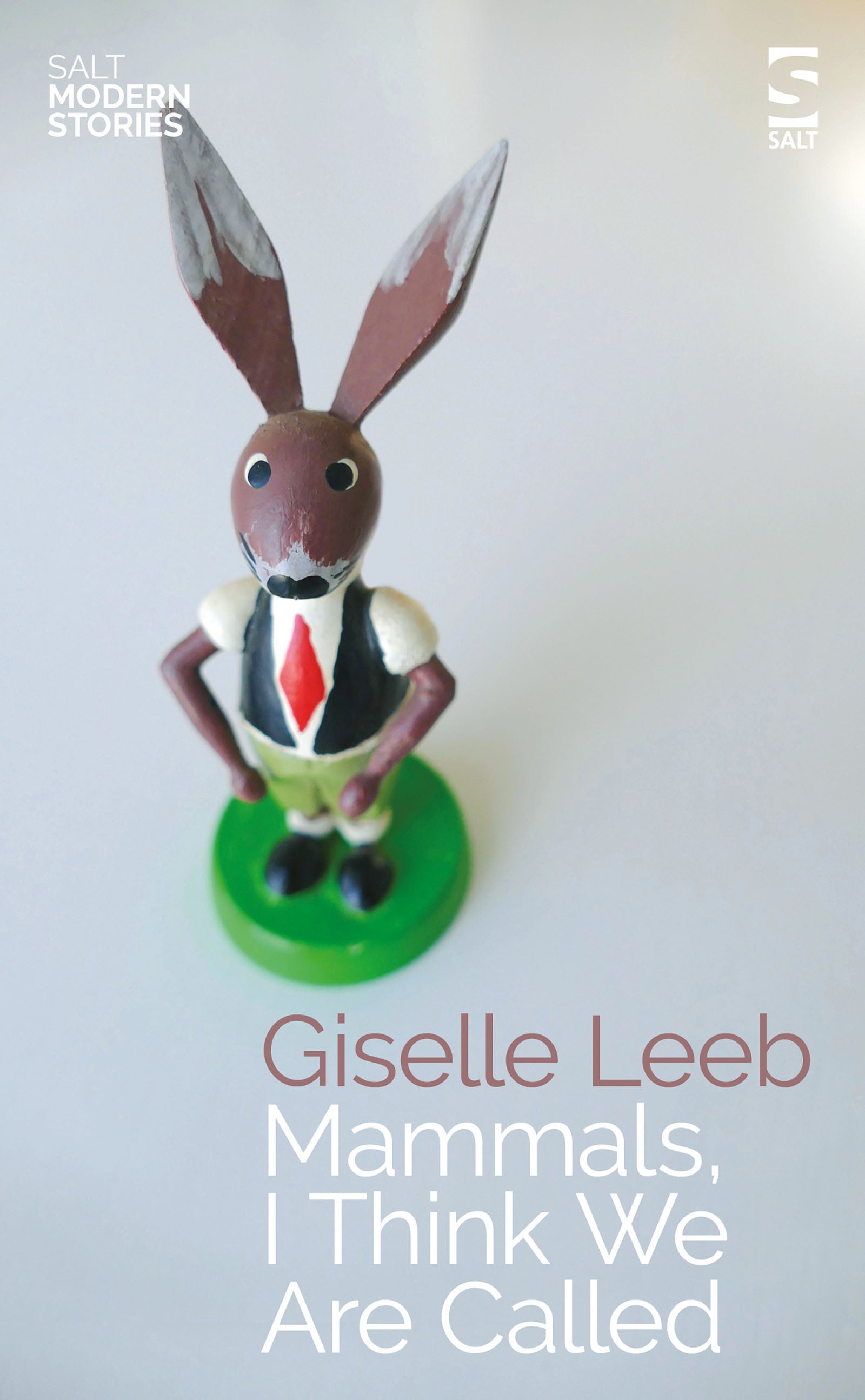Giselle Leeb
Mammals, I Think We Are Called
Mammals, I Think We Are Called
SKU:9781784632670
Couldn't load pickup availability
Series
Name: Salt Modern Stories Number: 5
Synopsis
Longlisted for The Edge Hill Short Story Prize 2023
 Ambitious and playful, darkly humorous and imaginative, these strikingly original stories move effortlessly between the realistic and the fantastical, as their outsider characters explore what it’s like to be human in the twenty-first century. Whether about our relationship with the environment and animals, technology, social media, loneliness, or the enormity of time, they reflect the complexities of being alive. Beautifully written and compelling, you won’t read anything else like them.
Ambitious and playful, darkly humorous and imaginative, these strikingly original stories move effortlessly between the realistic and the fantastical, as their outsider characters explore what it’s like to be human in the twenty-first century. Whether about our relationship with the environment and animals, technology, social media, loneliness, or the enormity of time, they reflect the complexities of being alive. Beautifully written and compelling, you won’t read anything else like them.
Meet the author
Reviews of this Book
‘I've been waiting for a collection of Giselle Leeb's short stories for a few years, and it's just as wonderful as I'd hoped! With wry dark humour and a boundless and inventive imagination, Leeb makes us look at the familiar with fresh eyes, taking us out of our everyday realities to explore everything that makes us human or non-human. From the weatherman in the opening story onwards, you won't want to put this book down, but you will make yourself because you don't want it to end. Everything that makes a great short story is here.’ —Tania Hershman
‘It is both thought-provoking and entertaining, perhaps because of the author’s constant focus on building a sense of atmosphere … A collection that manages to balance heavy topics, while also leaving the reader with a sense of hope, Leeb hits a balance … Skillfully ambiguous, dark and also optimistic, Mammals I Think We Are Called is a wonderful contribution to the local literary world.’ —Lizzy O’Riordan, Leftlion
‘These stories are startlingly weird, blackly hilarious, raw and dreamlike. The common thread I think is a breathtakingly of-this-moment sense of alienation – from the natural world, from each other, from a sense of what's true and what's deception. But there's always a shred of hope somewhere in among the disaffection and pain, and that's what pulls me through the moments of horror … I was surprised by the range and breadth of these stories, and in particular was amazed at the poise of "The Goldfinch is Fine", in which a weatherman gradually loses his mind over an irrational, then increasingly certain terror of rising seas, “Hooked”, in which collective, hallucinatory dreams reunite an isolated city, and “Barleycorn”, in which a mysterious plague of spontaneous hair growth coincides with a hunt for a serial killer. These are challenging stories that invite the reader to engage in unexpected depth.’ —Michael DeLuca
‘These eighteen short stories are fantastically imaginative and cover a wide range of themes including identity, psychology, and the environment. There is humour and darkness, joy and sorrow, realism and the Fantastick. There's extreme weather, toy apes coming to life, hauntings, cyborgs, and even cryogenics. Wide-ranging in theme and style, they were a delight.’ —Rupert Dastur
Praise for Previous Work
‘‘As You Follow’ by Giselle Leeb is superficially fantastical, but at heart it’s an observation on growing up – on mourning the loss of one’s youth and its concomitant joie de vivre; on stepping out of oneself and seeing how one’s former indefatigability, has slowly withered.’ —Bookmunch
‘Ambitious, playful and imaginative, this piece has acted as a reminder that there are always new ways of looking at familiar things, always new things to find in old places. Its interesting approach to narrative is as flat and deep as a Hopper painting and does its subject justice indeed.’ —Rosie Sherwood, Zelda Chappel and Harry Denniston
‘When I read the first line of ‘Are you cold monkey? Are you cold?’ by Giselle Leeb (actually, even the strange repetitive title hooked me) I hoped that its dreamy oddity wouldn’t leak away into realism. And it didn’t. This is an uncanny piece of writing whose point of view shifts between the ‘girl in the puddle’ with ‘thoughts stacked on top of her’ to the monkey in the laboratory who is seeing the world for the first time, hearing words for the first time, learning to feel hurt, suffer cruelty, feel want.’ —Nicci Gerrard
‘‘Ape Songs’ is a story about a buried girl and a mechanical ape. My mother, who does not generally read SF but is a smart lady, was savvy enough to call it a mix of Ray Bradbury’s ‘All Summer in a Day’ and Shirley Jackson’s ‘The Lottery’. I thought it was one of the weirder and more challenging stories I received; every time I read it I get something different out of it, and I’ve read it a lot. I find it blackly hilarious, though not without hope.’ —Michael J. deLuca
‘In ‘Thin’ Giselle Leeb takes on the subject of body image. She approaches this from a completely unique angle, using SF to make a powerful point: What is normal, after all, and why do we have such a complicated relationship with food, eating and our bodies?’ —Ann VanderMeer


